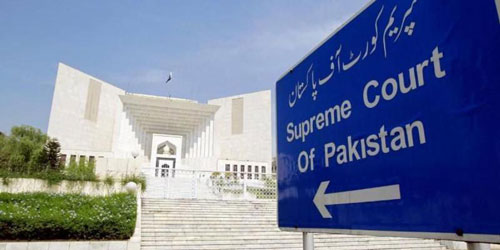Observer Report Islamabad
The Supreme Court restored on Thursday the Punjab local government system after the provincial government dissolved it before the expiry of its term in May 2019.
The top court also declared the Section 3 of the Punjab Local Government Act, 2019 unconstitutional.
Speaking on the matter, Chief Justice Gulzar Ahmed said that the local government representatives were elected for five years and their tenure cannot be cut short based on a single notification.
He added that laws can be made under Article 140 but the same cannot abolish government institutions.
The chief justice maintained that the government holds a certain stature, be it federal, provincial or local, adding that the law can only alter conditions or improve infrastructure of the government institutions.
During the hearing, apex court judge Justice Ijaz-ul-Hassan stated that all forms of government (federal, provincial and local) can only be abolished for a limited period of time.
He added that the people have been deprived of their representatives.
The SC judge asserted that the provincial government first announced holding re-elections in six months after the dissolution of local bodies.
He added that a 21-month extension was then extended to the Council of Common Interests.
The judge argued that the government is contradicting itself by wanting to take the power to the lower level and then abolishing the power itself.
The CJP further sought an explanation from the Pakistan Tehreek-e-Insaf Insaf-led Punjab government concerning the law under which the local bodies were abolished. He also asked why the bodies had still not been restored.
Replying to the SC bench, Punjab government’s counsel, Qasim Chauhan, said that the re-election for the local government bodies have been delayed due to the ongoing Covid-19 outbreak in the country.
Previously, the top court expressed serious concerns over the dissolution of local government system in Punjab before the expiry of its term and summoned Punjab advocate general to answer queries in this regard.
The top court asked the advocate general to explain whether the majority of the members of a provincial assembly had the authority to dissolve the local government when the elected officials are opponents.
“The AG should also tell whether by not holding the local government elections within the prescribed one-year period mentioned in sub-section (2) of section 3 of the Punjab Local Government Act, 2019 (later extended to 21 months) the dissolved local governments stand resurrected,” the order stated.
In view of this order, the Punjab government submitted its reply wherein it justified its decision to dissolve the local governments of the country’s most populous province before expiry of their term in May 2019.
“The purpose of dissolution of the previous local governments was to ensure a level playing field for all prospective candidates in the upcoming elections under the 2019 [LG] Act… “[The government wanted] to eliminate political influence of any kind; there was no other way that political parity could be achieved in such context,” the provincial government said in its reply submitted in the Supreme Court.










